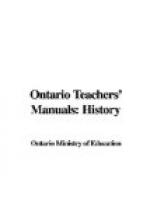With the same object in view, Champlain, in 1609, explored the Richelieu River and Lake Champlain. In 1613, he listened, only to be deceived, to the story of Vignau about a way to the East up the Ottawa River to a large lake and into another river that would lead to the Western Sea.
Henry Hudson made four voyages in search of a way through or round the continent. On the first, second, and fourth, he tried to go round by a North-west or a North-east passage. On the third voyage, in 1609, he sailed up the Hudson River for 150 miles, only to find his way blocked. A curious fact is that on this voyage he must, at one time, have been only about twenty leagues from Champlain, when the latter was exploring Lake Champlain on the same errand. (Show this on the map.) On his fourth voyage, in 1610, Hudson discovered the bay that now bears his name, and he must have thought, when he saw that great stretch of water to the West, that he was at last successful. He wintered there, and when the ice broke up in the spring, his men mutinied and set him, his young son, and two companions, adrift in a boat, and they were never heard of again. (See The Story of the British People pp. 234-235.)
The Mississippi was long looked upon as a possible way to the Pacific Ocean. La Salle explored the great lakes and the Ohio, Illinois, and Mississippi Rivers. This last he found to flow south into the Gulf of Mexico, instead of west into the Pacific Ocean. His settlement on Montreal Island was called La Chine (the French word for China), in allusion to his desire to find the way to that country.
Later, others were led by the same desire to explore the western part of what is now Canada. Verendrye, in 1731, travelled from Lake Nepigon by way of Rainy Lake, the Winnipeg River, and the Red River, to the junction of the latter with the Assiniboine, where Winnipeg now stands; also up the Saskatchewan River to the Forks. His son, in 1742, explored the Missouri River and came within sight of the Rocky Mountains.
Men of the Hudson’s Bay Company and of the North-West Company—Mackenzie, Fraser, Thompson, Simpson, Hearne—amid great hardships and through thrilling adventures, continued the work of exploring the waterways of the West to find an opening to the Pacific.
It has remained to the people of Canada to conquer the passes of the Rockies and Selkirks, build great transcontinental railways and steamship lines, and thus afford a direct short route from Europe to Cathay. What men had striven for during more than four hundred years it has been our lot to accomplish.
Other topics of interest suggested by the lesson may be taken up afterwards; for example, the opening of the Suez Canal and its effect on trade—why it did not restore supremacy to the Italian cities; the opening of the Panama Canal and its probable effect on commerce; the reasons why merchants prefer water routes to land routes, etc.




